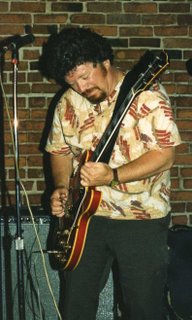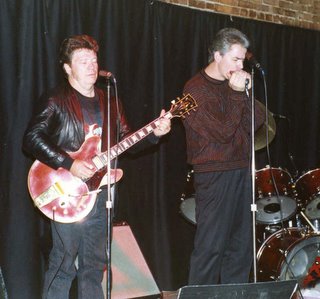The first time I met the blues.
By Tom McFarland
 In order to figure out when things happened in the past I have to pick an event that stands out in my mind and count backwards. For instance, I know that if I had graduated from high school, it would have been in 1962 at age 17. Therefore, I should be able to figure out when I was in the third grade. Counting backwards, and remembering that I skipped the sixth grade, I can determine that I took a year of piano lessons in 1953-54 at age eight and nine (my birthday is in January). The next year after, after seeing the movie "The Glen Miller Story" with Jimmy Stewart, I switched to trombone.
In order to figure out when things happened in the past I have to pick an event that stands out in my mind and count backwards. For instance, I know that if I had graduated from high school, it would have been in 1962 at age 17. Therefore, I should be able to figure out when I was in the third grade. Counting backwards, and remembering that I skipped the sixth grade, I can determine that I took a year of piano lessons in 1953-54 at age eight and nine (my birthday is in January). The next year after, after seeing the movie "The Glen Miller Story" with Jimmy Stewart, I switched to trombone.
I started dabbling with the guitar in 1955 at age ten. My brother had an electric guitar and amplifier (Silvertone) which he didn't have time to play and was kept in a closet in the living room. When everyone was gone from my house I would drag it out and fool around with it. When my brother caught me at this, instead of getting mad he gave them to me. And so it began.
Most of the electric guitar I heard on the radio in those days was country, except for Les Paul. My brother had 78's of him and Chet Atkins. In 1955 or 1956 I heard Elvis singing "Milk Cow Blues" on a jukebox. The thing that got me was Scotty Moore's guitar. Soon after, a cousin from L.A. turned me on to Little Richard and Chuck Berry. By 1962 I was listening to Duane Eddy and then the Ventures. I also had three jazz LP's: An Oscar Peterson Trio record with Barney Kessel on guitar, an album by guitarist Billy Bauer and an album by Herb Ellis called "Nothing But The Blues." On the first Duane Eddy album there is a song called "3:30 Blues" which knocked me out. I was starting to wonder - what is this blues stuff?
In Byrd's Market, in Grants Pass, Oregon, there was a record rack. Crown Records was the label. LP's for 99 cents. Most of it was country artists you never heard of, along with polka music and some comedy. One day I was searching through these records in hope of finding something I could relate to, and there IT was: "B.B. King - King Of The Blues". Here was this guy smiling at me, wearing a white shirt with French cuffs, and holding a Chet Atkins Gretsch guitar, the same model Duane Eddy played.
Needless to say, I forked over my 99 cents and rushed to the nearest turntable. The first thing I noticed when I opened the album was that the record was red. I put it on the turntable. After a brief horn intro I heard this heavenly voice singing "I've got a right to love my baby," followed by a three note guitar fill. I literally fell on the floor. It was what I had been looking for all my life. I felt as if my every need had been met. That sound went into the marrow of my bones, AND ALL THINGS WERE MADE NEW.
The King - B.B. King.
By Tom McFarland
Way back yonder in the days of old there was a record store on Union Avenue in Portland called Bop City. This was the local ghetto blues and gospel music source. I scored many a B.B. King side there on the Crown label. I found a store just like it in Oakland called The Pink Pelican. From there I bought the Phil Upchurch album with the instrumental "You Can't Sit Down," among other things. Around this time I also had an EP on Capitol by T-Bone Walker.
In 1962 I moved to Las Vegas and promptly began searching for the record store. I found it in North Las Vegas. It was called Larry's Music Bar. One day I was astounded to see a poster in the window saying, "Live-In Person-B.B. King And His Band!" I could hardly believe my eyes. Needless to say getting to that gig was my top priority. B.B. was appearing in The Gold Room at the convention center. This was a room about the size of the New Orleans that you could apparently rent from the city.
When the big night finally arrived I dressed in my only suit and drove through the desert. The place was packed. I was the only white person there, but no one seemed to mind or notice. The opening acts were Marvin Gaye and the Drifters. B.B.'s band of the time was one of the classic urban blues line ups: piano, bass, drums, and tenor, alto, and trumpet. After the opening acts and a few instrumentals by the band, B.B. made his appearance.
A small sea of humanity rushed to the stage. This was in 1962, so B.B. was 37 years old. He was wearing a black suit, a white shirt and a black tie. He was playing a sunburst Gibson ES-345 with a Bigsby (which he never used) through a tweed Fender Twin amp.
He opened with his hit "Please Love Me." This is the one that has the Elmore James-type intro, but in the key of E-flat. He looked like a preacher, sang like an angel and played like the devil. I remember thinking if any of those people in the audience (although it wasn't really an audience, it was something else) had been onstage singing with the guitar they would have sounded much like B.B..
Later, in the book "Urban Blues" by Charles Keil, I came across the phrase, "Spokesman for his people", and a bell rang. This is really all I remember about my first experience of seeing B.B. King live because shortly into the first song, I became entranced. In fact, I don't remember much of anything that ever happened after that.

Tom McFarland and Mike Lynch at the Owl Cafe - Seattle, about 1989.
3 comments:
Mike - It is a total gas to see these McFarland articles back in the public eye where they belong - he was a genuine Blues sage!
I hope some other writers out there with something to say will start sending stuff into Jet City! I know there are a lot more stories to be told!!
You know it DOES look like I still had some brown hair in that photo. Now, the real question is this - how come Tom McFarland, a cat about ten years older than me, doesn't appear to have ANY gray hair? Perhaps Jet City Blues should do an expose on the local blues talent that have hair that doesn't appear to be ageing at the correct rate?
The first time I saw B.B. King was at the Paramount Theatre in Seattle. There were three bands on the bill: a Seattle funk band, Lighting Hopkins (believe it or not!), and B.B. The Lighting Hopkins set was pretty bad because they hooked him up with the opening act's bass player and drummer, and Hopkins spent most of the set critizing them. Those poor guys probably thought that he was going to play 12 bar blues, which never happened, of course! B.B. and his band were freakin' great, as usual.
Post a Comment